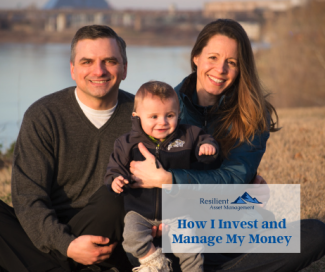
How I Invest and Manage My Money
Background
In the financial planning world, the ever more recognizable “Downtown” Josh Brown and his co-worker Brian Portnoy authored and edited an interesting book entitled How I Invest My Money. Along with the authors, some of the more recognizable names in the Financial Planning world, some of whom I am have met and another whom I know personally, described how they invest their own money. When I learned of the book, I assumed I would see spreadsheets, graphs, and a bunch of numbers...not so. Rather, the authors focused somewhat more on their philosophy towards money, which I came to appreciate more and more with each chapter. I recommend the book to you.
Seeing as Mr. Brown is extremely unlikely to ever seek my chapter in a second volume, I am left to publish it here. And more specifically, several Clients have asked about my personal finances. Since I am in the business for prescribing for others' finances, perhaps a word or two on my own is appropriate. So here it is…
My First Recollection of Money
My first recollection of money came after my extended family – 2 parents, 2 grandparents, 3 children (I am the youngest, and in my opinion the smartest), and 2 dogs – bivouacked from Slidell, Louisiana – 106 Fisher DR to be exact – to Jacksonville, Arkansas. I was later told this was the only “territory” available to a brand new Burger King (yes, THAT one!) franchisee. My dad had worked as a McDonalds executive, though he wanted his own restaurant. McDonalds balked, and thus my family was sprung into the Burger King world.
We lived a short distance from the first store – walking distance actually. I made the trek many times to “work”. I was only 5 at the time and vividly recall putting burger patties and buns through the broiler, many times standing on a chair - those were the days!!! The process has evolved somewhat over the last 42 years, though it is still recognizable to us “old schoolers”. Between bouts of working the broiler, my dad would ask me to count the number of 20s, 10s, 5s, and 1s in the cash register drawers in the office. In later years, I remember going to the stores with my Grandfather on Sundays to “open” – this was in the pre-breakfast days when we opened at 11 AM. As a teenager, I would go with my mom early in the morning to make the new 7 AM open. I remain tangentially involved with the family business to this day.
Skipping the rest of the nostalgia, my parents passed away about 18 months apart between 2007-2009, just over half-way through my Navy Career. Upon their passing, what my parents founded was left to my brother, sister, and me. What started as a single store in 1979 has grown to 22 today. My involvement in the “family business” undoubtedly helped shape how I invest my own money.
Personal Finance Hierarchy
Getting to the main point of the article, how I manage my personal affairs is summed up via the following graph:

Baseline Capital
Having observed my parents for many years, I learned how essential it is to have an ample capital base. By capital base, I am referring to what is commonly called an “Emergency Fund”. I always keep a copious amount in reserve to meet my estimate of many, many months of living expenses. No matter what opportunities arise, the Baseline Capital remains intact, and I never deviate from maintaining it...never, ever risk something that is important on something you don't need. In my personal financial plan, this liquidity is the lubricant that keeps the machine from overheating. Without a doubt, the world is less expensive with an Emergency Fund - a concept I pound home to ALL Resilient Asset Management Clients - perhaps more than one has grown exhausted hearing this from me. You can read more about it here and here.
Military Benefits
Military service is a lot of things, most of which are beyond the scope of this article. What is relevant are the benefits associated with an Active Duty Military Retirement. Most are familiar with the pension, fewer are aware of the medical benefits, and even fewer know about the VA Disability piece. Individually, each is a remarkable benefit. Collectively, the economic benefits of a military retirement are simply extraordinary. Not only does one have an inflation-adjusted annuity and medical coverage, the Military Retiree also has optionality to pursue whatever one wishes - everything from a Tiki Bar in Koh Samui, Thailand (don't laugh, its happened) to a Financial Advisory in Memphis, Tennessee!!! Optionality is a concept I frequently explain to Clients of Resilient Asset Management...we try very hard to achieve it for EVERY Client.
Core Equity Portfolio
In 2003, while on vacation, I happened upon a bookstore and was perusing the business section and decide to leaf through Buffett: The Making of an American Capitalist by Roger Lowenstein. Lowenstein’s book helped rid my eyes of the scales of an investing philosophy that resulted in very poor investment decisions. His book led to my poring through a different style of investment-related literature focused on a value-oriented approach to investing. I don’t know how much my copy of that book cost, though it would have been a bargain at 6 figures plus…my investment results pre-2003 compared to post-2003 are absolute night and day. On the off-chance that Mr. Lowenstein is reading this, I will humbly say in public, "Thank you, sir".
From the moment I ever earned ANY money, I was a dutiful saver and remain so currently. One lesson for ANYONE at any age is the remarkable results one can achieve simply by putting one foot in front of the other. Applying this simple concept to my portfolio, I have collected a number of concentrated equity investments in which I have tremendous confidence. The names are unimportant. What is important is that I consider each "stock" a fractional ownership interest in a business whose value compounds over time. Collectively, it's a "Chris Flis Inc." of sorts. Control and ticker prices are unimportant to me - the durability of the companies' competitive advantages and their wide economic moats trump control and intermediate values, period. Some of my investments pay dividends, which are collected and form new pillars within the Core Equity Portfolio as opportunities arise. The most senior portfolio position was initiated in 2004 and remains unchanged to this day. The 2009 period, when my parents passed away, was an opportune time to add to this collection as I inherited some money, which was accompanied by a severely declining stock market. March, 2020 offered a similar, though narrower, window.
My investments are scattered across a variety of taxable, tax-free, and tax-deferred accounts...asset location is a concept EVERY investor should apply to his/her portfolio. Since I was able, I have maximized IRA and employment-related (401(k) and TSP) contributions each year. I am a humongous believer in Solo 401(k)s…I'm almost positive my accountant has grown exhausted of hearing me say the word “Solo” over the past decade. Whatever the account type, this tranche of assets is my family’s wealth-growing engine...I cannot over-emphasize the economic power of compounding equity growth. I also maintain a 529 Plan for my son…few would argue that this is the premier savings vehicle for college.
While I firmly believe equity markets are mostly efficient, I do believe a long-term investor with a focused portfolio can outperform the broad market indices over time...many in my profession would vehemently disagree with that statement, which is okay. To be sure, an intrepid investor may have to endure long periods of looking foolish. For me, I don't find looking foolish burdensome...I'm a veteran of many fighter pilot Ready Rooms, so I'm well-trained in looking foolish- those who have trapped at night on a pitching deck are well-aware of what I'm talking about. The equivalent engineering concept is referred to as "Stress Hardening".
This portion of the pyramid remains fairly stagnant, produces a steady income stream via dividends, and requires little in the way of taxes as capital gains are infrequently taken because I'm a “Buy and Hold” investor. Additionally, from time-to-time, I use this portfolio as collateral for portfolio loans on an opportunistic basis. When I do, I limit the borrowings to around 25% of the portfolio, which allows for severe market corrections as we saw in March of 2020. Portfolio loans are most definitely not for everyone, so please don't enter into it after reading this. I am comfortable with the risk and find the lending rates very attractive. And the best part...the borrowing process is infinitely less cumbersome than dealing with a lender - no K-1s required.
Real Estate Investments
About 15 years into the Burger King business, my parents were able to invest in the commercial real estate upon which their Burger Kings sat. This was a significant change for them as it opened up a new wealth generating arc. Since their passing, the next generation has seriously morphed this part of the family business. We have bought, sold, built, and exchanged extensively within our real estate portfolio over the past decade.
Here is one recent example of our handiwork: We took what was the following 2 parcels of land - initially discovered, believe it or not, on Google Earth (I got to use that CompSci degree after all):

And after removing asbestos from the dilapidated building and various other "site work", transformed it into the following:

Indeed, my parents and grandparents would be exceptionally proud of how their real estate assets have evolved. And for anyone doubting the persistence of the greatness of our American Dream - simply put, you're wrong. If you don't believe me, try this on: my great grandmother arrived via boat from Poland in the early 1900s. She settled in the northeast and then, among other things I'm sure, had 4 children, including my Grandfather who was born in 1916. He was the first in his family to graduate from high school and went on to retire from the police force. Now, merely 105 years after his birth, his progeny are thriving in the greatest country our planet has ever known...countless other Americans have similar stories and more are written by the day. Write this down: America's best days are ahead of us.
Real Estate, at least the way we do it, is far from a sure thing. It usually involves significant borrowing and tremendous sums have to be fronted before the first Whopper sale is made. However, for restaurants that are successful, of course, the economic benefits are ample. I have coupled my portion of the family real estate assets with a few personal real estate investments of my own, which have generally worked-out well. For those who venture to Downtown Memphis, we at least have a neat building in which to meet. Here is a picture from Christmas time...you can juuuust barely make-out the logo on the door:

Overall, I think real estate is an excellent investment, though I also think it is somewhat over-rated in general. Many people want to jump into flips, rental units, and the like believing happy outcomes await. I usually recommend most Clients steer clear of such endeavors. This is not an asset class for the innocent and the penalties for selecting the wrong piece of real estate can be quite large, both economically and otherwise. Moreover, like any endeavor where there is money to be made, the competition is intense. Pretty much, if they've made a reality show or someone's offering a "seminar" about it, the opportunity has probably passed. Indeed, compare your prospective investment with simply owning an S&P 500 Index Fund...don't underestimate this comparison - I speak from experience.
Family Business
I maintain a substantial interest in my Family’s Burger King business. Looking back, it is amazing to me that my parents embarked on a franchising opportunity when they did with literally no safety net. Knowing the figures as I do today, it would be nearly impossible to support a family of 5 on one Burger King. And don’t forget, most restaurants are a 7-day a week operation. At the time it seemed quaint, but now when I read Flis Enterprises, Inc., Established 1979, it means a hell of a lot to me.
Our business composition is much different today. Meaning, the size of the business permits a much larger employee base who can manage the day-to-day operations throughout the operation. However, franchising in the fast-food space has also morphed significantly since 1979. Today, nearly every capital outlay is the responsibility of the franchisee – that’s my family! To be sure, fast food Franchisors were one of the first adopters of the “asset light” model that is all the rage today…earning a commission on someone else’s sales is a fantastic business.
Despite my ownership of the Burger King franchise, I knew Financial Planning would be my second act. However, I still keep my finger on the pulse in the restaurant space – it is nearly impossible to let something go that you started when you were 5!
Entrepreneurial Pursuits
When I retired from the Navy in 2016, my economic foundation afforded me the opportunity to try my hand at founding my own business. Realizing retirement was on the horizon while still on Active Duty, I enrolled in the Certified Financial Planner™ course work, took the exam and passed. I reserved a bit of time around my son’s birth and then turned two on starting my Financial Planning practice.
Any new endeavor is going to have zero revenue, at least on the first day…I was no exception. Perhaps starting a Financial Planning career with no Clients and no revenue was inadvisable. However, because of my pyramid, I had some time and runway to see if I could make it work. Clients started to trickle in after a short time, which formed my Firm’s foundation. Then, one thing led to another over the years and now Resilient Asset Management is a sustainable business. True, change is constant and the competition is fierce, thus future success is by no means guaranteed. However, I will endeavor to keep the Firm on its present growth arc.
I decided upon the Firm’s founding to provide financial support for 3 years. Meaning, I would divert funds from other parts of the pyramid for my Firm’s expenses. All revenues trickled into an Investment Account I opened in my Firm’s name. Within that account, I invest in the exact same securities I recommend to Clients…what’s good enough for a Client is good enough for the Firm. Over the years, the Firm has become sustainable to the point that it no longer requires financial support and can still add to its investment account. I anticipate this will remain the policy for many years to come. I derive immense professional joy from succeeding alongside my Clients investing in the same securities.
This portion of the pyramid is absolutely the least stable, though it is also the one with the highest growth potential. It is absolutely true that entrepreneurial success is one of the most lucrative paths for those who are successful at it. However, zeros are in-play here, so it is wise to be very careful. For me, I needed a very, very solid base before I was willing to make a go of it on my own. Others are more fearless, which is wonderful - that is part of what makes our American Economic Miracle the best capitalist result in the history of man. That said, I make no bones about the fact that there are many, many better entrepreneurs out there than me - of that, I am absolutely certain.
Conclusion
There you have it...that is about as exhaustive a description as I can give for how I manage and invest my money. For those who have made it all the way to the end, congratulations, you made it.



